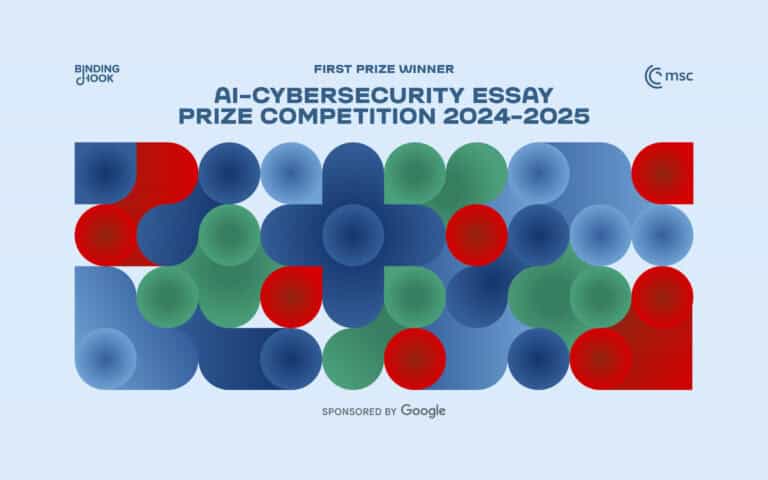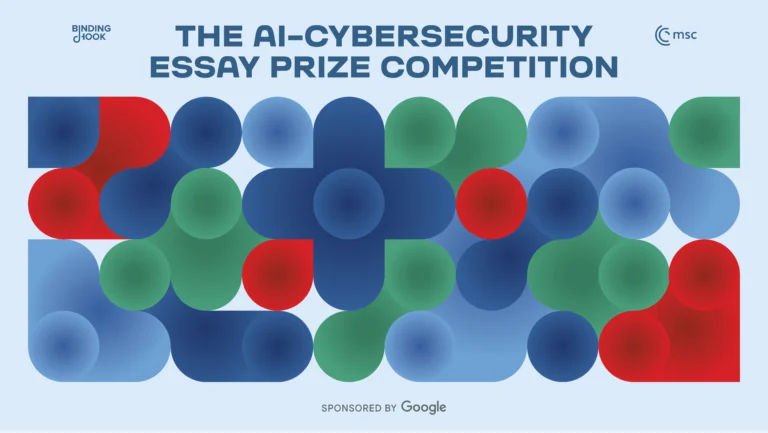Tech and security songs at full volume

January. The time to recover from the December celebrations and resolve to tackle the new year with vim and vigor. Whether you need a new gym playlist, looking for musical company while sweeping up dry tree needles, or just can’t stop thinking about security and technology while still on holiday, Binding Hook has a few tunes to kickstart the year.
A methodological note: To be included, the lyrics had to be about the security implications of emerging technology at the time of recording. The songs also had to rock pretty hard and be certified metaphor-free and unambiguously literal like the best written code.
Here’s the official first annual 2024 Binding Hook playlist. Load the songs on your favored analog or digital system, turn the volume up to 11, and welcome the new year.
“Wernher von Braun” by Tom Lehrer
Don’t say that he’s hypocritical
Say rather that he’s apolitical
“Once the rockets are up, who cares where they come down?
That’s not my department” says Wernher von Braun
The classics have a special place in the holiday music canon, and nothing is more classic than Tom Lehrer’s satirical ode to “good old American know how”, as provided by the Third Reich’s chief rocketeer.
The US government had an extensive program to harness former Nazi engineers to compete in the early Cold War; Von Braun was just one such character that caught on in pop culture. (For more, read ‘Operation Paperclip’ by Annie Jacobsen). In this reflective time, the song and book might inspire technology exporters looking for a belated new year’s resolution: no more microeletronics for Russian missiles.
“99 Luftballons” by Nena
99 red balloons
Floating in the summer sky
Panic bells it’s red alert
There’s something here from somewhere else
The war machine springs to life
Opens up one eager eye
Focusing it on the sky
West Germany’s Nena released the most danceable anthem about the dangers of errors in early warning in 1983 (competition in the category is admittedly modest). The song’s timing couldn’t have been more terrifyingly perfect.
By some accounts, 1983 was the most dangerous year of the nuclear age. The Soviets shot down a passenger plane and may have misinterpreted a NATO exercise as cover for a nuclear first strike. The United States announced plans for a missile defense shield and was pouring nuclear weapons into Europe, two moves that deeply unnerved the Warsaw Pact (read ‘Euromissiles’ by Susie Cobourn for the controversy that nearly broke the transatlantic alliance).
Humanity got lucky twice over that year: general nuclear war was postponed and the world witnessed the miracle of a German-language dance hit.
“Radioactivity” by Kraftwerk
Radioactivity
Discovered by Madame Curie
Radioactivity
Tune in to the melody
Radioactivity
Is in the air for you and me
Music groups concerned about the nuclear age proliferated in Germany. In 1975, electronic/industrial music pioneers Kraftwerk recorded an ode to the invisible power of radioactivity. After Chornobyl and other nuclear accidents in the 1980s, the band made an overt political decision to convert the song to an anti-nuclear power protest.
For effects of Chornobyl on even weightier matters than proto-electronica, read about how it set the stage for Ukraine’s independence from Moscow’s rule and the country’s decision to renounce its Soviet nuclear weapons inheritance in Mariana Budjeryn’s ‘Inheriting the Bomb’, the rare diplomatic history with more lyrical rhythm than most songs listed here.
“Electric Eye” by Judas Priest
Up here in space, I’m looking down on you
My lasers trace everything you do
You think you’ve private lives, think nothing of the kind
There is no true escape, I’m watching all the time
Tackling a heavy topic with heavier riffs and vocals that escape gravity, 80s power metal gods Judas Priest offer a Nagelian exploration of what it is like to be a spy satellite (pretty great, if you’re into that sort of thing).
But we’re a long way from the early 1980s (as your middle-aged correspondent notes with particular regretful shock) and the powers of surveillance have proliferated from a handful of spy satellites to thousands of commercial eyes in the sky, curious drones closer to earth, and browser tracking cookies. Nobody thinks they have private lives these days.
“Missiles” by The Sound
Deep in the country
The factories hide
Where they make the missiles
That run our lives
Some people like surprises. Those people don’t run governments in the nuclear age, who send spies and satellites in search of bomb and missile factories. The good news is that American and British intelligence is rather good at finding fissile material and the missiles that deliver them, if you’ll indulge the author a self-promotional link. The bad news is that knowing where the nuclear bombs are can prevent surprise, but not much else.
“Party in the CIA” by Weird Al
Stagin’ a coup like yeah
Brainwashin’ moles like yeah
We only torture the folks we don’t like
You’re probably gonna be okay!
Work at the US Central Intelligence Agency (CIA) has never sounded more compelling than in Weird Al’s satirical imagination. His spies are rogue assassins with “swagger” working “cloak and dagger”.
And if it sounds too damn good to be true, that’s because it is. Weird Al’s CIA more closely resembles the CTU of Jack Bauer or the IMF of Ethan Hunt than anything at Langley – so maybe hold off on submitting a resume showcasing your UC Berkeley waterboarding coursework.
As an urgent antidote to this inspired nonsense, read Amy Zegart’s ‘Spies, Lies, and Algorithms’ to counter the pop culture cliches that have shaped the public’s attitudes toward intelligence. (Although even she neither confirms nor denies whether the CIA has “a better dental plan than the FBI’s”.)
“The humans are dead” by Flight of the Conchords
Their system of oppression
What did it lead to?
Global robo-depression
Robots ruled by people
They had so much aggression
That we just had to kill them
Had to shut their systems down
If the robots kill us all, will they then sing about it? New Zealand’s musical duo Flight of the Conchords think so. The robots would even revel in their utilitarian improvements to life on Earth: “There is no more unethical treatment of the elephants / Well, there’s no more elephants, so / Well, still it’s good”.
The music scene might be a bit less expressive, with only one dance move surviving, but altogether the Kiwi comedians project a straightforward end to the human race after they made the fatal mistake of building robot servants. If you have read Kenneth Payne’s ‘I, Warbot’, you will have a nuanced and informed view on the future role of artificial intelligence and war. If you have not, watch out for robots wielding poisonous gasses.
We have set up a Spotify playlist here with these songs, as well as some honorable unmentioned tracks, for you to stream into your ears. Keep your eyes open for our return to regularly scheduled Binding Hook programming later this week.




